2017学年浙江省高三“五校联考”第二次考试英语试题卷(含答案)
浙江省瑞安市五校联考2017届中考第二次模拟考试英语试题含答案
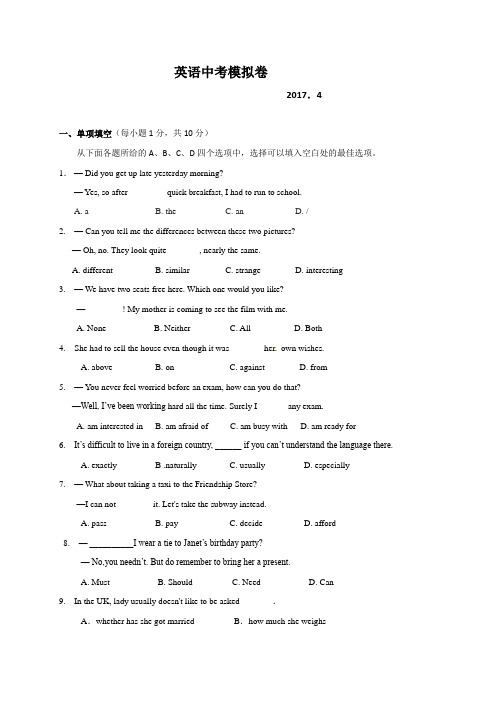
英语中考模拟卷2017.4一、单项填空(每小题1分,共10分)从下面各题所给的A、B、C、D四个选项中,选择可以填入空白处的最佳选项。
1.— Did you get up late yesterday morning?— Yes, so after ________ quick breakfast, I had to run to school.A. aB. theC. anD. /2. — Can you tell me the differences between these two pictures?— Oh, no. They look quite _______, nearly the same.A. differentB. similarC. strangeD. interesting3. — We have two seats free here. Which one would you like?— ________! My mother is coming to see the film with me.A. NoneB. NeitherC. AllD. Both4. She had to sell the house even though it was _______ her own wishes.A. aboveB. onC. againstD. from5. — You never feel worried before an exam, how can you do that?—Well, I’ve been workin g hard all the time. Surely I ______ any exam.A. am interested inB. am afraid ofC. am busy withD. am ready for6. It’s difficult to live in a foreign country, ______ if you can’t understand the language there.A. exactly B .naturally C. usually D. especially7. — What about taking a taxi to the Friendship Store?—I can not ________it. Let's take the subway instead.A. passB. payC. decideD. afford8. —__________I wear a tie to Janet’s birthday party?—No,you needn’t. But do remember to bring her a present.A. MustB. ShouldC. NeedD. Can9. In the UK, lady usually doesn't like to be asked _______.A.whether has she got married B.how much she weighsC.where does she come from D.how old is she10. —You look sad, Betty. What's the matter with you?—________A.I've got the first prize. B.I'm sorry to hear that.C.I can't attend the summer camp. D.I don't quite agree with you.二、完形填空(每小题1分,共15分)阅读下面短文,掌握其大意,然后从A、B、C、D四个选项中选出可以填入空白处的最佳答案。
2017年高考浙江卷英语试题及答案解析.pdf
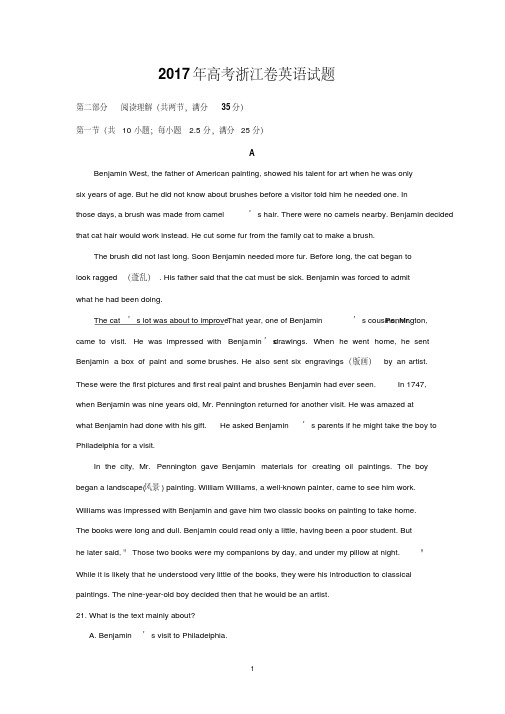
2017年高考浙江卷英语试题第二部分阅读理解(共两节,满分35分)第一节(共10小题;每小题 2.5分,满分25分)ABenjamin West, the father of American painting, showed his talent for art when he was onlysix years of age. But he did not know about brushes before a visitor told him he needed one. Inthose days, a brush was made from camel’s hair. There were no camels nearby. Benjamin decided that cat hair would work instead. He cut some fur from the family cat to make a brush.The brush did not last long. Soon Benjamin needed more fur. Before long, the cat began tolook ragged (蓬乱). His father said that the cat must be sick. Benjamin was forced to admitwhat he had been doing.Pennington, The cat’s lot was about to improve.That year, one of Benjamin’s cousins, Mr.came to visit. He was impressed with Benjamin’s drawings. When he went home, he sent Benjamin a box of paint and some brushes. He also sent six engravings(版画)by an artist. These were the first pictures and first real paint and brushes Benjamin had ever seen.In 1747,when Benjamin was nine years old, Mr. Pennington returned for another visit. He was amazed atwhat Benjamin had done with his gift. He asked Benjamin’s parents if he might take the boy to Philadelphia for a visit.In the city, Mr. Pennington gave Benjamin materials for creating oil paintings. The boy began a landscape(风景) painting. William Williams, a well-known painter, came to see him work.Williams was impressed with Benjamin and gave him two classic books on painting to take home.The books were long and dull. Benjamin could read only a little, having been a poor student. Buthe later said,"Those two books were my companions by day, and under my pillow at night."While it is likely that he understood very little of the books, they were his introduction to classical paintings. The nine-year-old boy decided then that he would be an artist.21. What is the text mainly about?A. Benjamin’s visit to Philadelphia.B. Williams’ influence on Benjamin.C. The beginning of Benjamin’s life as an artist.D. The friendship between Benjamin and Pennington.22. What does the underlined sentence in paragraph 3 suggest?A. The cat would be closely watched.B. The cat would get some medical care.C. Benjamin would leave his home shortly.D. Benjamin would have real brushes soon.23. What did Pennington do to help Benjamin develop his talent?A. He took him to see painting exhibitions.B. He provided him with painting materials.C. He sent him to a school in Philadelphia.D. He taught him how to make engravings.________.24. Williams’ two books helped Benjamin toA. master the use of paintsB. appreciate landscape paintingsC. get to know other paintersD. make up his mind to be a painter【解析】试题分析:本文属于记叙文,主要讲了美国绘画之父Benjamin在决定要成为一名画家之前的经历。
2017浙江省高考英语二模英语试题附参考答案
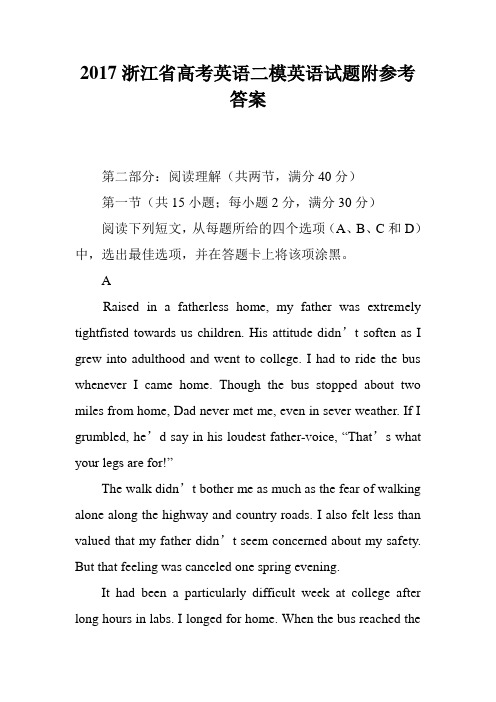
第二部分:阅读理解(共两节,满分40分)
第一节(共15小题;每小题2分,满分30分)
阅读下列短文,从每题所给的四个选项(A、B、C和D)中,选出最佳选项,并在答题卡上将该项涂黑。
A
Raised in a fatherless home, my father was extremely tightfisted towards us children. His attitude didn’t soften as I grew into adulthood and went to college. I had to ride the bus whenever I came home. Though the bus stopped about two miles from home, Dad never met me, even in sever weather. If I grumbled, he’d say in his loudest father-voice, “That’s what your legs are for!”
23. The author’s father watched behind the hedge because ______.
A. he was concerned about his son’s safety
B. he wanted to help his son build up courage
The walk didn’t bother me as much as the fear of walking alone along the highway and country roads. I also felt less than valued that my father didn’t seem concerned about my safety. But that feeling was canceled one spring evening.
2017学年浙江省高三五校联考答案
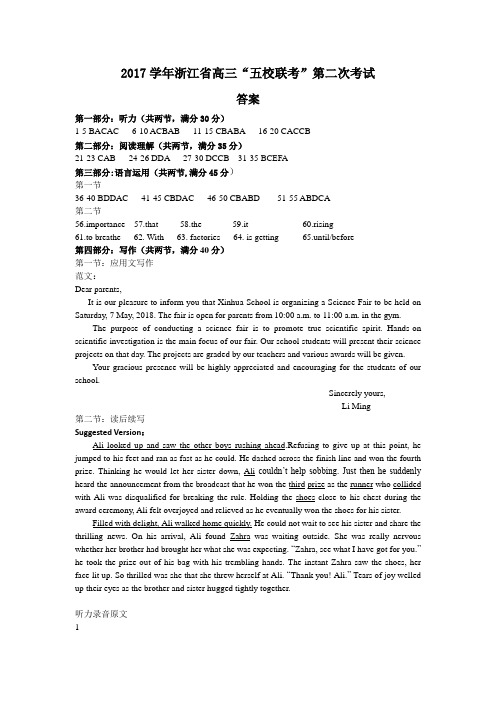
2017学年浙江省高三“五校联考”第二次考试答案第一部分:听力(共两节,满分30分)1-5 BACAC 6-10 ACBAB 11-15 CBABA 16-20 CACCB第二部分:阅读理解(共两节,满分35分)21-23 CAB 24-26 DDA 27-30 DCCB 31-35 BCEFA第三部分:语言运用(共两节,满分45分)第一节36-40 BDDAC 41-45 CBDAC 46-50 CBABD 51-55 ABDCA第二节56.importance 57.that 58.the 59.it 60.rising61.to breathe 62. With 63. factories 64. is getting 65.until/before第四部分:写作(共两节,满分40分)第一节:应用文写作范文:Dear parents,It is our pleasure to inform you that Xinhua School is organizing a Science Fair to be held on Saturday, 7 May, 2018. The fair is open for parents from 10:00 a.m. to 11:00 a.m. in the gym.The purpose of conducting a science fair is to promote true scientific spirit. Hands-on scientific investigation is the main focus of our fair. Our school students will present their science projects on that day. The projects are graded by our teachers and various awards will be given.Your gracious presence will be highly appreciated and encouraging for the students of our school.Sincerely yours,Li Ming第二节:读后续写Suggested Version:Ali looked up and saw the other boys rushing ahead.Refusing to give up at this point, he jumped to his feet and ran as fast as he could. He dashed across the finish line and won the fourth prize. Thinking he would let her sister down, Ali couldn’t help sobbing. Just then he suddenly heard the announcement from the broadcast that he won the third prize as the runner who collided with Ali was disqualified for breaking the rule. Holding the shoes close to his chest during the award ceremony, Ali felt overjoyed and relieved as he eventually won the shoes for his sister.Filled with delight, Ali walked home quickly. He could not wait to see his sister and share the thrilling news. On his arrival, Ali found Zahra was waiting outside. She was really nervous whether her brother had brought her what she was expecting. “Zahra, see what I have got for you.”he took the prize out of his bag with his trembling hands. The instant Zahra saw the shoes, her face lit up. So thrilled was she that she threw herself at Ali. “Thank you! Ali.” Tears of joy welled up their eyes as the brother and sister hugged tightly together.听力录音原文1M: This math puzzle is really beyond me.W: Well, if you can’t solve it, I won’t stand a chance.2M: Your computer makes such a loud noise. I guess there must be something wrong. You’d better have it checked out.W: You are right. I’ll do that later.3M: What’s the noise? It sounds as if it’s coming from next door. The Nelsons aren’t back yet, are they?W: I don’t think so. It must be the window-cleaner working upstairs.4M: I think there’s a mistake in our bill. We didn’t have dinner here last night.W: I’m sorry, sir. Here is the bill from the hotel restaurant. It’s got your signature on it.M: But that’s not my signature. I’d like to speak to the manager.5W: Good morning, Mr. Smith. I hope I’m not disturbing your work.M: Not at all, Mary. Come in and take a seat. I’m always in my office before lunch.W: I want to tell you that I have already started writing my paper and I’d like to discuss my topic with you.M: Of course. What would you like to work on?6M: This car goes from 0 to 60 in only 5 seconds. Not bad for something built in the old USA!W: Hmm, I usually don’t buy American. How do I know that this is going to be more reliable than something that’s made in Germany?M: Listen, ma’am,I’ve been driving a Ford for the past 20 years, and I mean the same Ford! These are the best in the business. I’m telling you.W: But is it safe?M: Well, that depends on how fast you want to drive!W: What?M: I’m just kidding. That was a joke! Seriously, though, the safety ratings are at the top of its class.I can show you the latest Consumer Reports if you want.W: No, that’s OK. I appreciate your time. I think I’m going to keep looking, though.M: All right. Let me know if I can help.7M: Hello, may I speak to Mr. Or Mrs. Baker, please?W: This is Mrs. Baker speaking.M: Hello, Mrs. Baker, this is Mr. Chin, Timothy’s English teacher. I’m calling because Timothy is struggling in English.W: He isn’t doing well? This is really upsetting. He must study h arder. I will talk to him about that immediately.M: Actually, I’m calling to offer my assistance. Timothy is already working hard in class, but he needs some extra help. If he could stay after class on Mondays and Wednesdays, I’d be able to help him improve. Would it be OK for him to stay after school on those days?W: Definitely. Thank you so much for offering help! I will talk to Timothy today and he’ll startstaying after school next week. Thank you for your concern!M: It’s my pleasure. I enjoy having Timothy in my class.8M: Debbie, I’m sorry to have to say this, but this lateness really can’t go on, you know?W: Oh, no, not again.M: What do you mean by that?W: Well, you’re always going on at me and I’m never more than five minutes late.M: Late is late, my girl! And if you don’t change your ways, I’m afraid I shall have to let you go. W: Let me go? Must you always put things the wrong way round? What you mean is you’ll fire me!M: Will you please stop being so aggressive and so cheeky?W: Oh, why don’t you shut up?M: Really! Debbie ... I never thought you’d... what you do you think you’re doing now?W: Doing? I’m getting my things together. That’s what I’m doing. There’s no need for you to fire me, Mr. Steiner. I resign!9W: How’s your computer c ourse going?M: Well, I’ve just had my class, actually. We have it twice a week and each one lasts two hours. W: That’s too long. Doesn’t it get boring?M: Well, you need that long to actually do a whole document. I can do all sorts of things on my computer that I never knew before.W: I can’t say the same for my cookery course.M: Oh, why not? I thought you were enjoying it.W: It’s enjoyable enough, but we just don’t seem to make much progress. We spent the whole of last week’s lesson learning how to fry an egg.M: So how often is it?W: Just once a week, for an hour and a half. It’s making cakes next week.M: Oh, that sounds fun.W: Yeah. I’m looking forward to it. I wanted to ask you something, actually. Have you learnt how to send e-mails on your cours e yet? I can’t get my computer to send them properly, and I was wondering if you’d show me how it’s done.M: Well, if you bring me one of your cakes, I suppose I could try.W: Great, well, when I’ve made them.10I don’t often lose things and I’m especiall y careful with money, so I was quite surprised when I reached for my wallet to pay for my dinner and it wasn’t there. At first, I thought it was possible that I could have left it at home. Then I remembered taking it out to pay for the taxi, so I knew I had it with me just before I walked into the restaurant. I wondered if it was possible that it could have slipped out of my pocket while I was eating dinner. Thinking about that possibility, I turned and walked back to the table where I had been sitting.Unfortunately, there were several other people sitting at the table at the time, so I called a waiter and explained to him that my wallet had fallen out of my pocket while I was sitting at the table a few minutes earlier. I had the waiter go over to the table to see if my wallet was on the floor. While the waiter was looking for it, the manager came up to me and asked me if anythingwas wrong. I didn’t want to get a lot of people involved in the problem, but I knew I had to get the wallet back. I told the manger what had happened. He had me describe the wallet to him, and then he insisted that I report it to the police. I told him that I didn’t want to set the police involved in it. Besides, I was in a hurry because I had an appointment with my doctor in just a few minutes. I explained to him that my biggest worry at the moment was how I was going to pay the check. He told me not to worry about that. He had me write down my name and address. And he said he would send me the bill.。
2019学年浙江省高三“五校联考”第二次考试英语试题卷(含答案)
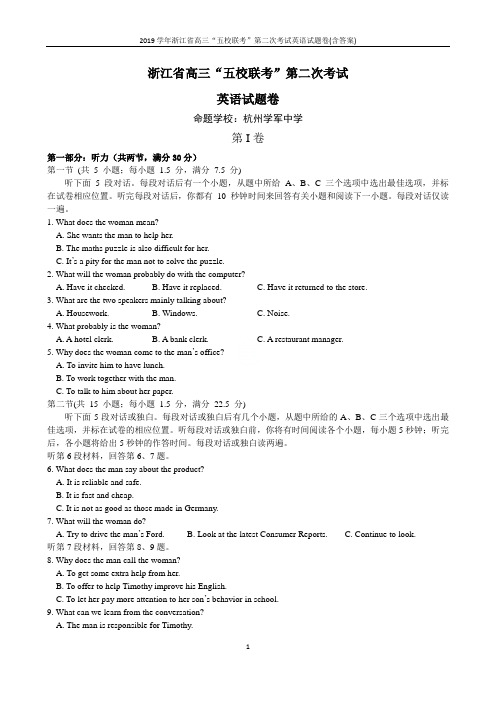
浙江省高三“五校联考”第二次考试英语试题卷命题学校:杭州学军中学第I卷第一部分:听力(共两节,满分30分)第一节(共5 小题;每小题 1.5 分,满分7.5 分)听下面5 段对话。
每段对话后有一个小题,从题中所给A、B、C 三个选项中选出最佳选项,并标在试卷相应位置。
听完每段对话后,你都有10 秒钟时间来回答有关小题和阅读下一小题。
每段对话仅读一遍。
1. What does the woman mean?A. She wants the man to help her.B. The maths puzzle is also difficult for her.C. It’s a pity for the man not to solve the puzzle.2. What will the woman probably do with the computer?A. Have it checked.B. Have it replaced.C. Have it returned to the store.3. What are the two speakers mainly talking about?A. Housework.B. Windows.C. Noise.4. What probably is the woman?A. A hotel clerk.B. A bank clerk.C. A restaurant manager.5. Why does the woman come to the man’s office?A. To invite him to have lunch.B. To work together with the man.C. To talk to him about her paper.第二节(共15 小题;每小题 1.5 分,满分22.5 分)听下面5段对话或独白。
2017年浙江卷(英语)含答案
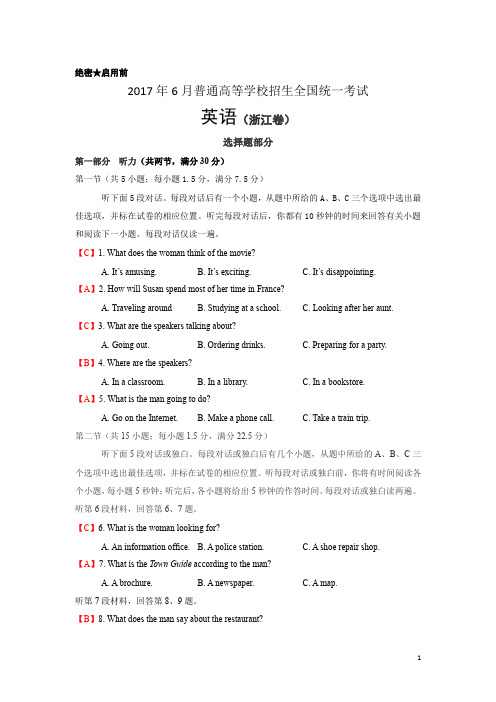
绝密★启用前2017年6月普通高等学校招生全国统一考试英语(浙江卷)选择题部分第一部分听力(共两节,满分30分)第一节(共5小题;每小题1.5分,满分7.5分)听下面5段对话。
每段对话后有一个小题,从题中所给的A、B、C三个选项中选出最佳选项,并标在试卷的相应位置。
听完每段对话后,你都有10秒钟的时间来回答有关小题和阅读下一小题。
每段对话仅读一遍。
【C】1. What does the woman think of the movie?A. It’s amusing.B. It’s exciting.C. It’s disappointing.【A】2. How will Susan spend most of her time in France?A. Traveling aroundB. Studying at a school.C. Looking after her aunt.【C】3. What are the speakers talking about?A. Going out.B. Ordering drinks.C. Preparing for a party.【B】4. Where are the speakers?A. In a classroom.B. In a library.C. In a bookstore.【A】5. What is the man going to do?A. Go on the Internet.B. Make a phone call.C. Take a train trip.第二节(共15小题;每小题1.5分,满分22.5分)听下面5段对话或独白。
每段对话或独白后有几个小题,从题中所给的A、B、C三个选项中选出最佳选项,并标在试卷的相应位置。
听每段对话或独白前,你将有时间阅读各个小题,每小题5秒钟;听完后,各小题将给出5秒钟的作答时间。
每段对话或独白读两遍。
2017届浙江省五校高三第二次联考英语试题及答案

2017学年浙江省第二次五校联考英语试题卷说明:本试卷共5大题,满分120分,考试时间120分钟。
所有试题必须在答题卡上作答。
第一部分英语知识运用(共两节,满分30分)第一节单项填空(共20题;每小题0.5分,满分10分)从A、B、C、D四个选项中,选出可以填入空白处的最佳选项,并在答题纸上将该选项符号涂黑。
1. —Shall we go out for a meal tonight?—__________. We haven’t been out for ages.A. No botherB. That’s all rightC. Not reallyD. I’d love to2. Although Albert Einstein would someday be _________ famousscientist, he did not like __________ school.A. a; 不填B. a; theC. the; 不填D.the; the3. Experts and teachers all think that failure is not _____a bad thing to some extent.A. greatlyB. necessarilyC. definitelyD.fully4. Afraid __________? This type of anxiety can deeply disturbpeople’s enjoyment of social relationships.A. of laughing atB. to be laughed atC. of being laughed atD. being laughed at5. Children’s brains cannot develop properly _________ they lack protein.A. becauseB. sinceC. whenD. unless6. Supposing you _________ the lottery, what would you do with the money?A. would winB. have wonC. had wonD. won7. If our marketing plan succeeds, we _______ the sales by thirty percent next year.A. would increaseB. will increaseC. would have increasedD. will be increasing8. Although we may not realize ________, when we talk withothers we make ourselves understood not just by words but also by body movements.A. itB. themC. thatD. ourselves9. It is the respect for universal rights, our respect fordifferent cultures, and our _________ to international laws that guide China's openness to other countries.A. comprehensionB. contributionC. commitmentD. consideration10. This is John’s photo. We miss him very much. He _______trying to save a girl in the earthquake.A. is killedB. was killedC. has been killedD. had been killed11. Alex has finally become an astronaut, __________all hisfamily members think is his dream career.A. whichB. whoC. thatD. whom12. The information confirms me in the belief __________ he,as well as his coach, is to blame.A. whetherB. whyC. whichD. that13. A horrible thought _________ him when he was waiting forTom in the airport: what if the plane from Malaysia had been hijacked(劫持)?A. attackedB. struckC. beatD. occurred14. All the travelling fare, unless specifically stated_________, includes admission charges to the attractions, shows and exhibitions we visit.A. otherwiseB. likewiseC. thereforeD. still15. The famous actor keeps fit and athletic by __________at the gym for an hour every morning.A. making outB. figuring outC. working outD. turning out16. I’m hoping that John will let us have the car tonight;__________, I’m afraid we won’t be able to go out.A. even ifB. if soC. what ifD. if not17. ______ being an outstanding physician and scientist, he was an accomplished writer and a gifted artist.A. As far asB. As well asC. As soon asD. As long as18. Everybody says Rebecca and John is a perfect match; noone has ever known __________ couple.A. a betterB. the betterC. a bestD.the best19. —I had the computers repaired yesterday.—How much did they _________ for that?A. costB. spendC. takeD.charge20. —Do you think Catherine likes Fred?—__________. They don’t seem to get on very well together.A. It dependsB. I hope soC. I imagine notD. Sounds reasonable第二节:完形填空(共20小题;每小题1分,满分20分)阅读下面短文,掌握其大意,然后21~40各题所给的四个选项(A、B、C和D)中,选出最佳选项,并在答题纸上将选项标号涂黑。
2017高三年级五校联考二
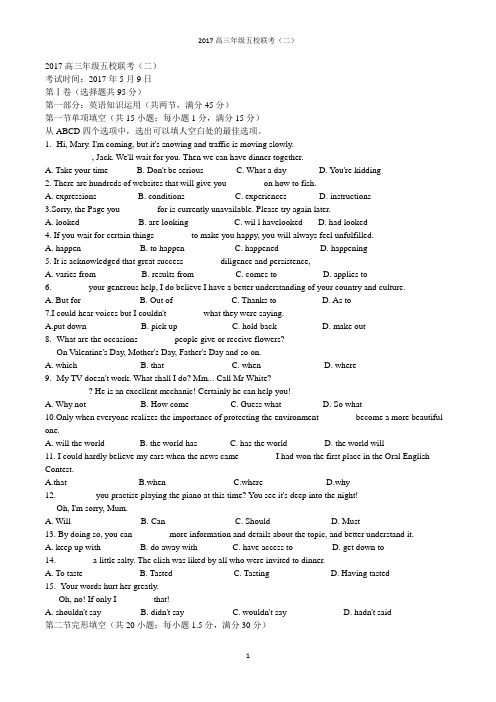
2017高三年级五校联考(二)考试时间:2017年5月9日第Ⅰ卷(选择题共95分)第一部分:英语知识运用(共两节,满分45分)第一节单项填空(共15小题;每小题1分,满分15分)从ABCD四个选项中,选出可以填人空白处的最佳选项。
1. -Hi, Mary. I'm coming, but it's snowing and traffic is moving slowly.-________, Jack. We'll wait for you. Then we can have dinner together.A. Take your timeB. Don't be seriousC. What a dayD. You're kidding2. There are hundreds of websites that will give you________ on how to fish.A. expressionsB. conditionsC. experiencesD. instructions3.Sorry, the Page you________ for is currently unavailable. Please try again later.A. lookedB. are lookingC. wil l havelookedD. had looked4. If you wait for certain things________ to make you happy, you will always feel unfulfilled.A. happenB. to happenC. happenedD. happening5. It is acknowledged that great success________ diligence and persistence,A. varies fromB. results fromC. comes toD. applies to6. ________your generous help, I do believe I have a better understanding of your country and culture.A. But forB. Out ofC. Thanks toD. As to7.I could hear voices but I couldn't________ what they were saying.A.put downB. pick upC. hold backD. make out8. -What are the occasions ________people give or receive flowers?-On Valentine's Day, Mother's Day, Father's Day and so on.A. whichB. thatC. whenD. where9. -My TV doesn't work. What shall I do? Mm... Call Mr White?________? He is an excellent mechanic! Certainly he can help you!A. Why notB. How comeC. Guess whatD. So what10.Only when everyone realizes the importance of protecting the environment ________become a more beautiful one.A. will the worldB. the world hasC. has the worldD. the world will11. I could hardly believe my ears when the news came________ I had won the first place in the Oral English Contest.A.thatB.whenC.whereD.why12.- ________you practise playing the piano at this time? You see it's deep into the night!-Oh, I'm sorry, Mum.A. WillB. CanC. ShouldD. Must13. By doing so, you can________ more information and details about the topic, and better understand it.A. keep up withB. do away withC. have access toD. get down to14.________ a little salty. The clish was liked by all who were invited to dinner.A. To tasteB. TastedC. TastingD. Having tasted15.- Your words hurt her greatly.- Oh, no! If only I ________that!A. shouldn't sayB. didn't sayC. wouldn't sayD. hadn't said第二节完形填空(共20小题;每小题1.5分,满分30分)阅读下面短文,掌握大意,然后从16~35各题所给的A.B.C.D四个选项中,选出最佳选项。
- 1、下载文档前请自行甄别文档内容的完整性,平台不提供额外的编辑、内容补充、找答案等附加服务。
- 2、"仅部分预览"的文档,不可在线预览部分如存在完整性等问题,可反馈申请退款(可完整预览的文档不适用该条件!)。
- 3、如文档侵犯您的权益,请联系客服反馈,我们会尽快为您处理(人工客服工作时间:9:00-18:30)。
绝密★考试结束前2017学年浙江省高三“五校联考”第二次考试英语试题卷命题学校:杭州学军中学本试卷分第I卷(选择题)和第II卷(非选择题)两个部分。
第I卷1至6页,第II卷7至8页。
满分150分,考试120分钟。
注意事项:1.答题前,考生务必将自己的姓名、准考证号填写在答题卡上。
2.在答选择题时,用2B铅笔把答题卡上对应题目的答案标号涂黑。
如需改动,用橡皮擦干净后,再选涂其他答案标号。
不能答在本试题卷上,否则无效。
第I卷第一部分:听力(共两节,满分30分)第一节(共5 小题;每小题 1.5 分,满分7.5 分)听下面5 段对话。
每段对话后有一个小题,从题中所给的A、B、C 三个选项中选出最佳选项,并标在试卷的相应位置。
听完每段对话后,你都有10 秒钟的时间来回答有关小题和阅读下一小题。
每段对话仅读一遍。
1. What does the woman mean?A. She wants the man to help her.B. The maths puzzle is also difficult for her.C. It’s a pity for the man not to solve the puzzle.2. What will the woman probably do with the computer?A. Have it checked.B. Have it replaced.C. Have it returned to the store.3. What are the two speakers mainly talking about?A. Housework.B. Windows.C. Noise.4. What probably is the woman?A. A hotel clerk.B. A bank clerk.C. A restaurant manager.5. Why does the woman come to the man’s office?A. To invite him to have lunch.B. To work together with the man.C. To talk to him about her paper.第二节(共15 小题;每小题 1.5 分,满分22.5 分)听下面5段对话或独白。
每段对话或独白后有几个小题,从题中所给的A、B、C三个选项中选出最佳选项,并标在试卷的相应位置。
听每段对话或独白前,你将有时间阅读各个小题,每小题5秒钟;听完后,各小题将给出5秒钟的作答时间。
每段对话或独白读两遍。
听第6段材料,回答第6、7题。
6. What does the man say about the product?A. It is reliable and safe.B. It is fast and cheap.C. It is not as good as those made in Germany.7. What will the woman do?A. Try to drive the man’s Ford.B. Look at the latest Consumer Reports.C. Continue to look.听第7段材料,回答第8、9题。
8. Why does the man call the woman?A. To get some extra help from her.B. To offer to help Timothy improve his English.C. To let her pay more attention to her son’s behavior in school.9. What can we learn from the conversation?A. The man is responsible for Timothy.B. Timothy missed many English classes.C. Timothy doesn’t study hard in English.听第8段材料,回答第10至12题。
10. What is the relationship between the two speakers?A. Father and daughter.B. Boss and employee.C. Teacher and student.11. What does the man ask the woman to do at first?A. Stop talking.B. Get her things.C. Arrive on time.12. What kind of person is the woman?A. Cold-blooded.B. Hot-tempered.C. Warm-hearted.听第9段材料,回答第13至16题。
13. What does the man think of his computer course?A. It’s useful.B. It’s boring.C. It lasts too long.14. What does the woman say about her cookery course?A. It’s very boring.B. It’s a slow process.C. It’s not enjoyable enough.15. How long is the cookery course per week?A. One and a half hours.B. Two hours.C. Four hours.16. What does the woman want the man to do?A. Lend her his computer.B. Taste the cakes she made.C. Teach her to send e-mails.听第10段材料,回答第17至20题。
17.When did the man most probably lose his wallet?A.W hen he was having dinner.B.W hen he was ordering his dishes.C. When he was paying the taxi driver.18.Who helped the speaker to look for his wallet around the table?A.The police.B. The manager.C. The waiter.19.Why was the man in a hurry?A.He had to go to the bank.B.He wanted to report to the police.C. He had to meet his doctor.20.What was the man’s biggest worry?A.He lost his ID card.B.He couldn’t pay for the dinner.C. He got a lot of people involved in his problem.第二部分:阅读理解(共两节,满分35分)第一节(共10个小题;每小题2.5分,满分25分)阅读下列短文,从每题所给的A、B、C和D四个选项中,选出最佳选项,并在答题卷上将该选项涂黑。
AI have many wonderful memories of my days as a circus clown (马戏团小丑), but there is one day that I would rather forget: July 6, 1944. We were playing a two-day stand in Hartford, Connecticut, and the big top caught fire.I could hear grandstand chairs slamming inside the tent as people headed toward the exits. Some were jumping twelve feet from the top rows of the grandstand and seats to the ground outside. Most of the crowd was pouring through the regular exits and it soon became a panic.In the midst of this scene the musicians had kept on playing until the tent was on fire over-headbecause they knew music sometimes might work wonder; they had jumped off the bandstand just before a flaming quarter-pole fell into their stand.City fire equipment had arrived by now and was pouring streams of water onto the big top area to cool it enough for firemen to enter. In the smoke and confusion, it was impossible to tell whether or not anyone might have been left in the tent. We circus people were ordered away from the smoking ruins that, only a few minutes before, had been the biggest spread of canvas in the world.I went outside; doctors, and first-aid workers were everywhere, carrying bodies from where the grandstands and seats had been. The toll (伤亡人数) of dead and dying increased so fast that emergency crews were called in from surrounding cities.Later it was found that 168 people had died in the fire —the worst circus disaster in history, and an afternoon of horror I can never forget.21.The musicians kept playing during the fire probably because they ________.A.thought the fire was in another tentB.knew nothing about the terrible fireC.wanted to keep the crowd from panickingD.believed the show should go on whatever happened22.Why were emergency crews from other cities called in?A. There were too many victims to deal with.B. Fire equipment in the city was not enough.C. Too many people were left in the tent waiting.D. The circus people were unwilling to do the rescue work.23. Which of the following can be the best title of the passage?A. A Journey to DeathB. The Day the Big Top BurnedC. Memories as a circus clownD. The Worst Disaster in Human HistoryBIn a new look at the impact of long-time sitting behavior on health, a new study links time watching television to an increased risk of death. One of the most surprising f indings is that it isn’t just couch potatoes who were affected. Even for people who exercised regularly, the risk of death went up the longer they were in front of the TV. The problem was the long periods of time spent sitting still.Australian researchers who tracked 8,800 people for an average of six years found that those who said they watched TV for more than four hours a day were 46% more likely to die of any cause and 80% more likely to die of cardiovascular (心血管的) disease than people who reported spending less than two hours a day in front of TV.Time spent in front of TVs and computers and videogames has come under fire in studies in recent years for contributing to a spread of obesity in the US and around the world. But typically the resulting public-health message urges children and adults to put down the Xbox controller and remote and get on a treadmill (跑步机) or a soccer field.The Australian s tudy offers a different view. “It’s not the sweaty type of exercise we’re losing,” says David Dunstan, a researcher at Baker IDI Heart and Diabetes Institute, Melbourne, who led the study. “It’s the incidental moving around, standing up and using muscles. That doesn’t happen when we are plunked on a couch in front of a television.”Indeed, participants in the study reported getting between 30 and 45 minutes of exercise a day, on average.The results are supported by a new field of research that shows how long periods of inactivity can affect the body’s processing of fats and other substances that contribute to heart risk. And they suggest that people can help decrease such risk simply by avoiding extended periods of sitting.”Keeping such processes working more effectively doesn’t require constant intense exercise, but consciously adding more routine movement to your life might help, doctors say. “Just standing is better than sitting,” says Gerard Fletcher, a cardiologist at Mayo Clinic, Jacksonville, Fla., who works standing up at his computer. “When you stand up, you shuffle around a little bit and u se muscles not required when you are sitting or lying down.”Simple strategies for increasing activity include combining household chores such as folding laundry with TV-watching time or getting up to change a TV channel rather than using a remote control.The report, published Tuesday in the American Heart Association journal Circulation, focuses on TV watching in part because it is the main leisure-time activity in many countries, researchers said, especially in the US.24.One misunderstanding people might have is that ________.A. the radiation from TV may badly affect your sightB. TV programs can broaden your horizons effectivelyC. watching TV very long is a good way to kill timeD. regular exercise can minimize the side effect of watching TV25. What is new about the discovery of the Australian study?A. Remote control shouldn’t be used when people watch TV.B. People who watch TV too long should take more physical exercise.C. Sitting too long in front of TV will lead to high risk of heart attack.D. Long-time sitting is bad for all people including those who exercise regularly.26. According to the Australian study, how can the risk of death be reduced when people watch TV?A. By increasing simple movement.B. By totally avoiding watching TV.C. By taking some medicine.D. By increasing sweaty type of exercise.CDuring the past three hundred years, when a country gains its freedom or independence, one of the first things established is a national anthem (国歌). National anthems are generally played and sung at formal state occasions and other events which celebrate or support the country’s national identity.Holland’s 16th-century hymn (songs of prayer typically addressed to God) “Het Wilhelmus” is widely considered the world’s oldest national anthem, followed by the U.K.’s “God Save the King/Queen” —also a hymn, popularized in the 1740s. As nationalism spread throughout Europe in the 18th and 19th centuries, so did anthems. Many countries, such as the independent states that are today part of Germany, took “God Save the King/Queen” as a model and adopted hymns. Others, especially Spain and France, chose marches (songs with a strong, regular rhythm often performed by army bands). With imperialism (扩张主义), Europeans spread their musical taste. Even when former colonies gained independence, they often imitated the traditions of their former rulers. The result is that most anthems are either hymns or marches, played on European instruments.Japan’s anthem makes for a good case study of European influence. In the 1860s a British conductor living in Japan, John William Fenton, noted that the country did not have a national anthem. A local officer, Ōyama Iwao,selected the lyrics (歌词) from an ancient poem and Fenton wrote the melody (旋律). About a decade later, a Japanese committee chose a replacement melody by a court musician —one that had been composed for traditional Japanese instruments, but in a mixed style influenced by Fenton’s arrangement. The version in use today was also adapted by German Franz Eckert to fit a Western scale (音阶).In addition to hymns and marches, British composer Michael Bristow identifies a couple of more minor categories. National anthems in South and Central America are often operatic, with long, complicated orchestral introductions. These were influenced by 19th-century Italian opera. Burma and Sri Lanka are both in a folk group, as they rely more on traditional instruments.27. Which of the following is NOT mentioned as a basis to write national anthems?A. Prayer songs.B. Marching songs.C. Italian opera music.D. Movie theme music.28. What is the second paragraph mainly about?A. The function of national anthems.B. The world’s oldest national anthem.C. The origin and spread of national anthems.D. Reasons why many countries have national anthems.29. What can we learn about Japan’s national anthem?A. It was not written until the 20th century.B. The lyrics were written by a Japanese officer.C. The melody was first written by a British musician.D. The current version is hardly influenced by western music.30. What can be inferred about the influence of European imperialism on national anthems?A. Human rights are a common theme in national anthems.B. National anthems of some countries share similar musical features.C. Many national anthems were chosen by ruling European countries.D. Local traditions were ignored in the composition of national anthems.第二节(共5小题;每小题2分,满分10分)根据短文内容,从短文后的选项中选出能填入空白处的最佳选项。
